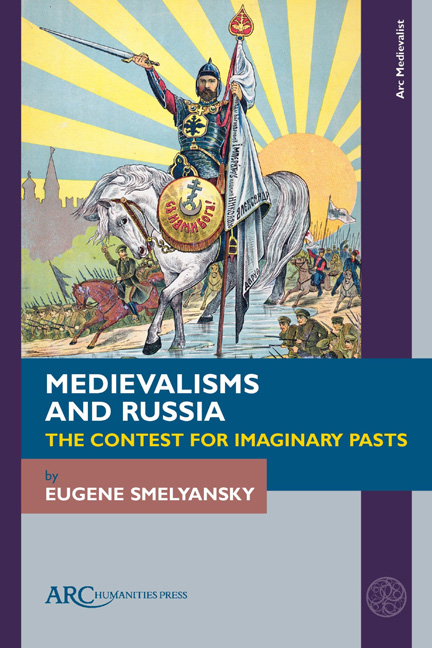Book contents
- Frontmatter
- Contents
- List of Illustrations
- Acknowledgements
- Names, Transliteration, and Abbreviations
- Introduction
- Chapter 1 A Contested Inheritance: Medieval Rus and Russia’s Origin Myths
- Chapter 2 Alexander Nevsky: The Once and Future Prince
- Chapter 3 Byzantine Dreams: Russia as the “Third Rome”
- Chapter 4 Medievalism as Allegory: The Middle Ages in Unofficial Culture
- Conclusion
- Select Bibliography
- Index
Chapter 4 - Medievalism as Allegory: The Middle Ages in Unofficial Culture
Published online by Cambridge University Press: 08 May 2024
- Frontmatter
- Contents
- List of Illustrations
- Acknowledgements
- Names, Transliteration, and Abbreviations
- Introduction
- Chapter 1 A Contested Inheritance: Medieval Rus and Russia’s Origin Myths
- Chapter 2 Alexander Nevsky: The Once and Future Prince
- Chapter 3 Byzantine Dreams: Russia as the “Third Rome”
- Chapter 4 Medievalism as Allegory: The Middle Ages in Unofficial Culture
- Conclusion
- Select Bibliography
- Index
Summary
IN LATE FEBRUARY 2022, Russia's full-scale invasion of Ukraine coincided with a simultaneous crackdown on domestic dissent. New laws criminalizing even casual criticism of the Putin regime had a chilling effect on Russian-speaking social media. Some voices fell silent, others spoke in euphemisms. Among the latter, “The Suffering Middle Ages” (“Stradaiushchee Srednevekovie”), a project with accounts on several social media platforms, became a surprising antiwar rallying point. Created a few years earlier by Konstantin Meftakhudinov and Iurii Saprykin, then students at Moscow Higher School of Economics, “The Suffering Middle Ages” started as a social media page for sharing medieval-themed memes. The project won its early fans by writing humorous captions making fun of overly emotive or “suffering” facial expressions in medieval art. “The Suffering Middle Ages” has since expanded into producing medieval-themed merchandise, a board game, and even publishing a book series by prominent medievalists. Its most recent venture is a learning platform featuring courses in the humanities taught by emigree scholars forced to flee Russia in recent years. Still, memes remain the projects most popular output, especially during the war. In the largest conflict of the twenty-first century, images shared over social media have become as much a tool of resistance as “Radio Free Europe” during the Cold War. On one particularly poignant image, a man's body is half-consumed by a monstrous dragon. “It's not that simple, we don't know the whole truth,” announces the Pythonesque caption, mocking the de facto slogan of Russia's state propaganda. Yet the content of the image speaks for itself, echoing a surreal disconnect between the brutality of Russia's actions and the propagandists’ attempts to lull their audiences into the comfort of epistemic apathy.
At first glance, medieval art may seem an odd medium for expressing dissent. In actuality, “The Suffering Middle Ages” and its creators continue a decades-long tradition of using the Western Middle Ages as a form of political and social commentary in the Soviet Union and Russia. Since the late 1930s, appeals to medieval western Europe became a safer form of expression for artists and intellectuals seeking to share their experiences of living under totalitarian or authoritarian regimes.
- Type
- Chapter
- Information
- Medievalisms and RussiaThe Contest for Imaginary Pasts, pp. 89 - 108Publisher: Amsterdam University PressPrint publication year: 2024

